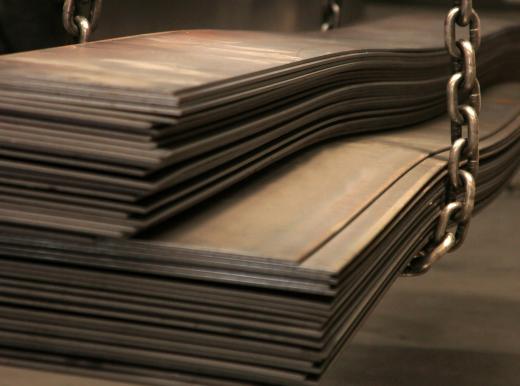A metal hole puncher is a device that is designed to cut through a circular section of metal by using mechanical or hydraulic pressure. These devices can be either hand operated or automated, and are also available for a wide range of different types of metal. The purpose of a metal hole puncher can be to create holes in a workpiece, or to punch out metal discs for various uses. Handheld metal hole punchers are typically used for small projects and thin sheets of copper, tin, and other soft metals, while larger automated units tend to be found in commercial and industrial operations. One type of metal hole puncher makes use of computer numerical control (CNC), and can use a variety of tips to create different sizes of holes.
There are a number of different types of metal hole punchers that are used in a variety of circumstances. Small, handheld metal punches are often used for crafting purposes or to create holes, through which rivets can be inserted, while large industrial units are often used in fabrication processes. These devices can be operated manually, use pressure generated by a hydraulic ram, or other means.

The simplest metal hole punchers are handheld tools that bear a superficial resemblance to pliers. These tools consist of a punch and a ring shaped component that are attached to handles. A thin sheet of metal can be inserted between the punch and the ring, and when the handles are squeezed together a hole will be created, much as with a paper puncher. Since this type of hole puncher can only generate a limited amount of pressure, these tools are typically only useful for punching holes in metal that is 18 gauge or thinner.

Other handheld metal hole punchers are hydraulically actuated, and can be used to punch through much thicker metal. These tools are often used in construction operations, and some units are capable of applying up to 34 tons (about 30 metric tons) of pressure. That makes them capable of punching through materials that are up to 0.5 inches (127 mm) thick, depending on the type of metal. A larger and heavier hydraulic metal hole puncher will typically be able to punch through even thicker materials, while also operating at a slower speed than smaller units.
One type of metal hole puncher is used primarily in commercial and industrial fabrication processes. These hole punchers can be standalone units, though it is also possible to fit some CNC machines with punches and dies of all sorts. A CNC metal hole puncher can be used to create accurate holes in workpieces, using a variety of differently sized punches. These punches sometimes also have features, such as spring-loaded pins, that are capable of ejecting the metal slug after a hole has been punched.
